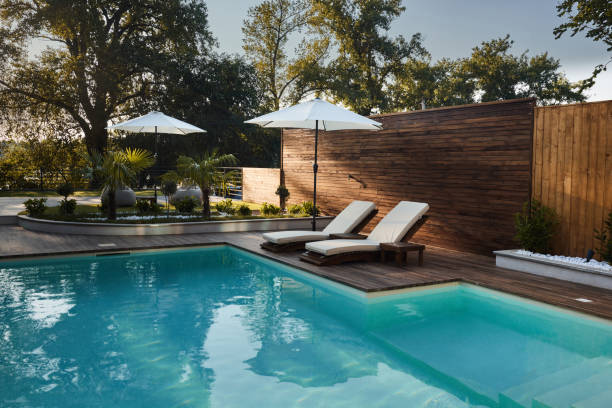The question of building a swimming pool in Switzerland is a hot topic for many homeowners. With summers getting hotter and hotter, the idea of having your own pool becomes very attractive. However, before taking the plunge, it’s essential to weigh up the pros and cons, as well as considering the regulatory and financial aspects specific to Switzerland.
Advantages of building a swimming pool in Switzerland
1. Wellness and leisure: A private swimming pool offers an incomparable space for relaxation and leisure. It’s ideal for cooling off, exercising and spending time with family and friends.
2. Property enhancement: A well-designed pool can increase the value of your home. This can be an asset when reselling, especially in regions where swimming pools are popular.
3. Personalization and comfort: Having a pool at home means you can choose the design, dimensions and functions to suit your tastes and needs.
Disadvantages of building a swimming pool
1. High initial cost: Building a swimming pool represents a substantial investment. Costs can vary according to size, type of pool (in-ground, semi-in-ground, above-ground), and materials used.
2. Maintenance and upkeep: A swimming pool requires regular upkeep to ensure clean, healthy water. This includes the purchase of chemicals, filter cleaning and, if necessary, repairs.
3. Regulations and permits: In Switzerland, building a swimming pool can be subject to strict regulations. It is often necessary to obtain permits from the local authorities, and to comply with safety and environmental standards.
Regulatory Considerations
Before embarking on the construction of a swimming pool in Switzerland, it’s crucial to find out about local regulations. Here are some key points to consider:
– Permis de Construire: Check with your local authorities to find out whether a building permit is required. Rules may vary from region to region.
– Distance to Property Limits: Make sure you respect the minimum distances required by law between the pool and your property limits.
– Safety: Pools often need to be equipped with safety devices, such as fences or covers, to prevent accidents.
Alternatives to the Traditional Pool
If cost or regulatory constraints put you off, there are several alternatives:
– Above-ground pools: Less expensive and generally easier to install, they don’t require major earthworks.
– Jacuzzis and Spas: offer similar relaxation benefits, but are more compact and often less costly to maintain.
– Swimming Ponds: Ecological and aesthetically pleasing, they can represent an interesting alternative for those seeking a more natural solution.
Conclusion
Building a swimming pool in Switzerland is a decision that needs to be carefully considered. The advantages in terms of well-being and property enhancement are undeniable, but must be weighed against initial costs, maintenance constraints and local regulations. For those looking to enjoy the pleasures of swimming without the inconvenience, alternatives exist and are worth exploring. Before making a decision, consult professionals in the sector and find out more from your local council to guarantee a project with no surprises.
Ultimately, whether you opt for a traditional pool or an alternative solution, the important thing is to choose what best suits your lifestyle and budget.

